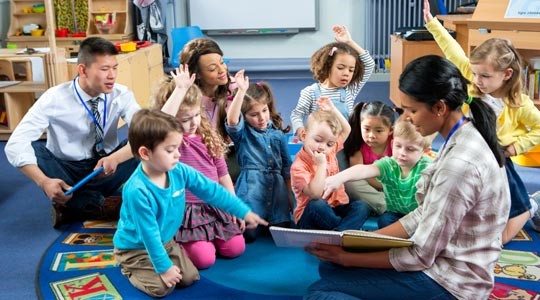As an educator, one is given the responsibility of cultivating and strengthening young minds. An essential component of this task is ensuring students are literate. According to the latest report by the International Literacy Association (ILA), early literacy is considered vital, while Digital Literacy is a current trending topic. Another form of literacy that is important in the 21st century is Culturally Relevant Literacy. Encouraging children to read and write at a young age and building on that foundation throughout their learning experiences as students, educators and parents alike are laying solid groundwork and equipping children with tools needed for their future success.
Early Literacy Deconstructed
Early literacy is defined as “what children know about reading and writing before they actually read or write.” According to everychildreadytoread.org, there are six pre-reading skills for children from birth through five years of age. These skills are:
- Print motivation: How excited and interested children are in books.
- Print awareness: Knowing how to follow words on a page, as well as how to hold a book.
- Phonological awareness: The understanding that words are made up of smaller sounds.
- Vocabulary: Knowing the names of things, feelings, concepts, and ideas as well as connecting the words to real life.
- Narrative skills: Ability to describe things and events; being able to tell and understand stories.
- Letter knowledge: Awareness that each letter is different and comes with a unique name and sound.
Educator awareness of each of these six skills serves to reinforce and prepare literacy skills of students even before children dive into their first book.
Digital Literacy
According to the American Library Association, “Digital literacy is the ability to use information and communication technologies to find, evaluate, create, and communicate information, requiring both cognitive and technical skills.” In a world that is becoming more technology driven on a daily basis, this skill-set is growing increasingly important. Digital literacy is already prioritized in several schools across the nation. The U.S Department of Education notes, “Technology ushers in fundamental structural changes that can be integral to achieving significant improvements in productivity.” The Department of Education also highlights the benefits of online learning, explaining, “Online learning opportunities and the use of open educational resources and other technologies can increase educational productivity by accelerating the rate of learning; reducing costs associated with instructional materials or program delivery; and better utilizing teacher time.” Examples of tech friendly schools can be seen all across the United States, from elementary schools to colleges and universities. Through the integration of technology into the learning experience, students are able to digest information through several different mediums, allowing a better opportunity for that information to be retained.
Culturally Relevant Literacy
Culturally relevant literacy is vital to ensuring that students receive the quality education that they deserve. According to the official blog of the National Council of Teachers of English, educators who prioritize culturally relevant teaching have the following characteristics:
- “hold high academic expectations,
- demonstrate cultural competence, the understanding that their own worldview and understandings may or may not align with those of their students, and
- are sociopolitically aware, that is, they have a willingness to acknowledge and critique inequity.”
Educators who embody these teaching practices create a culturally aware and diverse classroom environment that enables students to apply the principles they learn to daily life.
Benefits of Strong Literacy Skills
A solid foundation in literacy can be an essential aspect of career advancement or success. For many corporate or office positions, a requirement of the application process is to write a cover letter along with submitting a resume. A solid literacy foundation would play a vital part in the successful composition and presentation of such materials. Effective use of digital literacy skills also play a major role in nonverbal communication. Long distance communication via text message or instant messaging can often have messages that are skewed, because meanings may not be clear. Digital literacy plays a part in this by promoting contextual awareness, using both cognitive and technical skills.






